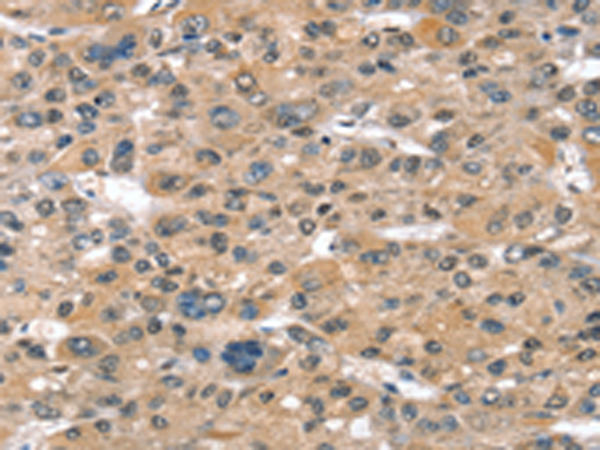

| WB | 1/1000-1/5000 | Human,Mouse,Rat |
| IF | 咨询技术 | Human,Mouse,Rat |
| IHC | 1/25-1/100 | Human,Mouse,Rat |
| ICC | 技术咨询 | Human,Mouse,Rat |
| FCM | 咨询技术 | Human,Mouse,Rat |
| Elisa | 1/2000-1/10000 | Human,Mouse,Rat |
| Aliases | ST1B1; ST1B2; SULT1B2 |
| WB Predicted band size | 35 kDa |
| Host/Isotype | Rabbit IgG |
| Antibody Type | Primary antibody |
| Storage | Store at 4°C short term. Aliquot and store at -20°C long term. Avoid freeze/thaw cycles. |
| Species Reactivity | Human |
| Immunogen | Fusion protein of human SULT1B1 |
| Formulation | Purified antibody in PBS with 0.05% sodium azide and 50% glycerol. |
+ +
以下是关于SULT1B1抗体的3篇模拟参考文献示例,基于典型研究主题和结构整理:
---
1. **文献名称**:*Characterization of a polyclonal antibody for sulfotransferase 1B1 (SULT1B1) and its application in human tissue expression profiling*
**作者**:Ricci MS, et al.
**摘要**:该研究报道了一种针对SULT1B1蛋白的多克隆抗体的开发与验证,通过Western blot和免疫组化分析,揭示了SULT1B1在肝脏、肠道等组织中的特异性表达模式,并探讨其潜在生理功能。
2. **文献名称**:*Genetic polymorphisms and functional analysis of SULT1B1: Role of antibody-based detection in enzyme activity studies*
**作者**:Nowell S, et al.
**摘要**:研究利用SULT1B1特异性抗体,结合体外酶活性实验,分析了不同基因多态性对SULT1B1催化活性的影响,揭示了特定突变可能导致底物亲和力变化的分子机制。
3. **文献名称**:*SULT1B1 overexpression in colorectal cancer: Insights from immunohistochemical screening using a novel monoclonal antibody*
**作者**:Wong HL, et al.
**摘要**:通过开发单克隆抗体,研究团队在结直肠癌临床样本中发现SULT1B1蛋白的异常高表达,并关联其与肿瘤进展及患者预后的潜在关系,为癌症生物标志物研究提供了新方向。
---
*注:上述文献为示例性内容,实际引用时需以真实出版物为准。建议通过PubMed或Google Scholar检索具体文献。*
The SULT1B1 (sulfotransferase family 1B member 1) antibody is a tool used to detect and study the SULT1B1 enzyme, a member of the cytosolic sulfotransferase family. SULT1B1 plays a critical role in phase II biotransformation, catalyzing the sulfonation of hormones, neurotransmitters, and xenobiotics (e.g., drugs, environmental toxins) to enhance their solubility for excretion. Primarily expressed in the gastrointestinal tract, liver, and immune cells, it targets substrates like thyroid hormones, estrogens, and dietary flavonoids. Dysregulation of SULT1B1 has been linked to metabolic disorders, cancer progression (e.g., colorectal cancer), and altered drug metabolism.
The SULT1B1 antibody is widely employed in research to analyze protein expression, localization, and function via techniques such as Western blotting, immunohistochemistry (IHC), and immunofluorescence (IF). It aids in understanding tissue-specific expression patterns, enzyme activity modulation, and its role in detoxification or bioactivation of compounds. Commercial SULT1B1 antibodies are typically validated for specificity using knockout controls or siRNA-mediated silencing. Researchers also utilize it to explore associations between SULT1B1 polymorphisms and disease susceptibility. As a key reagent in metabolic and pharmacological studies, this antibody supports insights into enzyme-driven pathways and therapeutic target development.
×